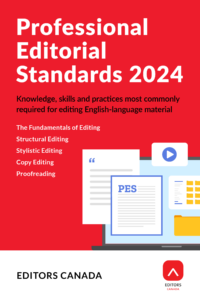Additions include conscious language, accessibility, and legal or ethical matters
FOR IMMEDIATE RELEASE
Toronto, April 16, 2024—The Editors’ Association of Canada (Editors Canada) has released the 2024 edition of Professional Editorial Standards. This new edition is now available as a free download.

What are Professional Editorial Standards?
This cornerstone publication describes the knowledge, skills and practices most commonly required for editing English-language material. Professional Editorial Standards clarify what is expected of Canadian editors and define the criteria against which their knowledge, skills and practice can be measured. They cover the core standards that all Canadian editors follow, regardless of the type of material they work on or how they edit.
“What editors do and what people should expect of the editor they hire are important questions,” says Editors Canada president Maria Frank. “We’re thrilled with this new edition of Professional Editorial Standards, which will help to define and guide the essential work that editors do and inform professional development and hiring decisions.”
What’s new in the 2024 edition?
Highlights include the additions of conscious language and accessibility as Fundamentals and the idea that any editorial issues related to legal or ethical matters or conscious language and accessibility are Fundamentals and editors at all stages are required to understand them and flag them wherever they encounter them.
New sections include:
- Acceptable error rates
- Acceptable productivity rates
- Accessibility
- Conscious language
- Editorial teams
- Ongoing professional development
- Structural editing in plain language
- Stylistic editing of narratives, conscious language, and stylistic editing in plain language
Revised or expanded sections include:
- Communication
- Ethical considerations
- Introduce no new errors
- Legal considerations
Why have Professional Editorial Standards?
Several groups use the Standards.
Editors use the Standards to do the following:
- better understand the skills and knowledge they are expected to demonstrate
- support their own continuing education and professional development
- explain what editing is and what editors do
- define best practices for doing their work
Employers use the Standards to do the following:
- know what to expect from the editors they hire
- develop job descriptions
- create performance evaluation tools
Clients use the Standards to do the following:
- know what to expect from the editors they hire
- understand and negotiate editors’ services
Educators use the Standards to do the following:
- develop editing training courses and programs
Editors Canada uses the Standards to do the following:
- develop and maintain professional certification
- explain what editors should do when performing various stages of editing
- increase awareness of the value of editing
- provide products and services to editors throughout their careers
- offer publications, webinars and presentations on editing
- support and advance excellence in editing and the interests of editors
What should you expect of a professional editor in Canada? Visit the Editors Canada website to download a free copy of Professional Editorial Standards.
– 30 –
About Editors Canada
Editors Canada began in 1979 as the Freelance Editors’ Association of Canada to promote and maintain high standards of editing. In 1994, the word “Freelance” was dropped to reflect the association’s expanding focus to serve both freelance and in-house editors. As Canada’s only national editorial association, it is the hub for 1,300 members and affiliates, both salaried and freelance, who work in the corporate, technical, government, not-for-profit and publishing sectors. The association’s professional development programs and services include professional certification, an annual conference, seminars, webinars, and networking with other associations. Editors Canada has four regional branches: British Columbia; Toronto; Ottawa–Gatineau; and Quebec, as well as smaller branches (called twigs) in Atlantic Canada, Barrie, Calgary, Edmonton, Hamilton-Halton, Kingston, Kitchener-Waterloo-Guelph and Manitoba.
Media contact
Michelle Ou (she/elle)
Senior Communications Manager
Editors Canada
communications@editors.ca